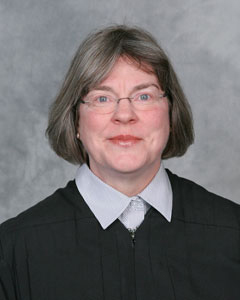 TOPEKA—District Judge Kay Huff of the 7th Judicial District has been appointed to sit with the Kansas Supreme Court to hear oral arguments in four cases on the court's October 29 docket.
TOPEKA—District Judge Kay Huff of the 7th Judicial District has been appointed to sit with the Kansas Supreme Court to hear oral arguments in four cases on the court's October 29 docket.
After hearing oral arguments, Huff will join Supreme Court justices in their deliberations and decision drafting.
“I am pleased that District Judge Huff is taking time from her duties in the 7th Judicial District to sit with the Supreme Court,” said Chief Justice Lawton Nuss. “It's a great help to our court, and we look forward to her contributions in deliberating and eventually deciding this case.”
Huff became a judge in January 2011 in the 7th Judicial District, composed of Douglas County. She oversees both criminal and civil cases.
"It is a privilege to serve with the Supreme Court," she said. "I very much appreciate the chance to see the work of the Supreme Court on a first-hand basis."
Huff grew up on a farm in northwest Missouri. She graduated from Reed College in Portland, Oregon, in 1979 and from the University of Pennsylvania School of Law in 1982.
She first worked as a litigator in civil cases and then as a public defender. When she and her husband, Jon Kahn, moved to Lawrence in 1988, she worked as a public defender in Topeka and Johnson County. She then had a private law practice in Lawrence and worked part-time as a clinical professor for the Defender Project at the University of Kansas School of Law.
All Supreme Court oral arguments are webcast live through the Watch Supreme Court Live! link in the right-hand column of the Kansas judicial branch website at www.kscourts.org.
The cases Huff will hear October 29:
Appeal No. 117,149: Royce Williams v. GEICO General Insurance Co.
Sedgwick County: (Petition for Review) Williams was injured in an automobile collision in December 2015. Williams was insured by GEICO, and he applied for personal injury protection benefits under the terms of the policy. Williams' right leg was fractured, and he could not put weight on it for 12 weeks. Williams and his wife worked opposite schedules. After the accident, she frequently missed work to care for him. Williams said he would pay her $25 per day for her additional care. On March 7, 2016, Williams filed a limited action proceeding against GEICO claiming certain personal injury protection benefits remained unpaid, including "substitution benefits" for the services performed by his wife. GEICO denied liability. The district court granted summary judgment to Williams in the amount of $2,625 for substitution benefits under K.S.A. 40- 3103(w) for services performed by his wife. However, the district court denied Williams' request for attorney fees. GEICO appealed the judgment in favor of Williams. Williams did not crossappeal the denial of attorney fees. The Court of Appeals reversed the district court and held Williams was not entitled to substitution benefits. Issue on review is whether Williams incurred a monetary loss requiring the payment of "substitution benefits" as defined by K.S.A. 40-3103(w) when the ordinary and necessary services were provided by Williams' wife.
Appeal No. 118,120: State of Kansas v. Sherman N. Jenkins
Shawnee County: (Criminal Appeal) After a high-speed chase and accident that caused the death of a passenger in another vehicle, a jury convicted Jenkins of felony murder, aggravated battery, driving while suspended, theft after two or more prior convictions, driving without tail lamps, and two counts of felony eluding police. Issues on appeal are whether: 1) the trial court erred in admitting jailhouse phone calls where there was insufficient evidence Jenkins was one of the voices on the calls; and 2) K.S.A. 8-1568(b)(1)(E) is unconstitutionally vague because "moving violations" is not defined and is subject to multiple meanings.
Appeal No. 116,810: State of Kansas v. Amber E. Burden
Sumner County: (Petition for Review) Burden's daughter B.B. gave drug paraphernalia to her father when he ate lunch with her at school. B.B. said the paraphernalia belonged to Burden. B.B.'s father reported the incident. Police officers went to Burden's residence, entered without a warrant, and found drug paraphernalia and small quantities of marijuana and cocaine. A jury found Burden guilty of unlawfully possessing marijuana and cocaine. On appeal, Burden argued the district court erred in finding her competent to represent herself at trial and in instructing the jury that it "should" find her guilty if it had no reasonable doubt as to the claims the State was required to prove. The Court of Appeals affirmed. The Supreme Court granted review on the competency issue. Issue on review is whether the district court failed to properly evaluate Burden's competency to represent herself by applying the test used to determine competency to stand trial.
Case No. 121,050: In the Matter of Daniel Vincent Saville, Respondent
Original Proceeding Related to Attorney Discipline: (Six-month suspension) The Supreme Court admitted Saville to the practice of law in Kansas in 1993. Saville practices criminal law in Wichita. After Saville represented a client in a DUI case, he decided to assist the client with a paternity case. Saville began a sexual relationship with the client and provided financial assistance to her. He continued representing her in about 10 separate legal matters. The client eventually filed a protection from stalking case against Saville. The hearing panel unanimously recommends Saville's license be suspended for six months and that he undergo a reinstatement hearing under Rule 219 prior to considering the reinstatement of his license. The disciplinary administrator recommends Saville be suspended for one year. Saville recommends his plan of probation be adopted and he be allowed to continue to practice law subject to the probation terms.